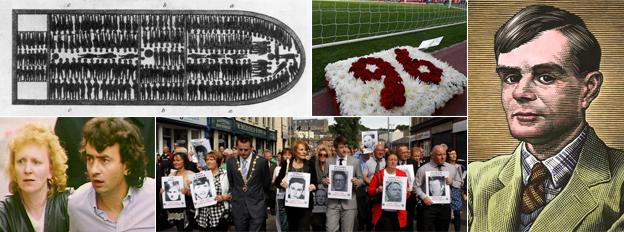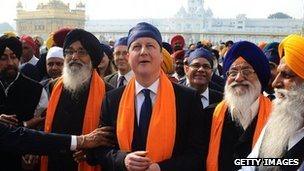At-a-glance: Apologies for the past by UK prime ministers
- Published

David Cameron has described the Amritsar massacre as a "deeply shameful event". Although he stopped short of a formal apology, it joins a number of other events - which predate their arrival in No 10 - that UK prime ministers have tackled in recent years.
British 1919 Amritsar Massacre, February 2013

David Cameron was given a tour of the Golden Temple in Amritsar, the holiest place in the Sikh religion
During a visit to India David Cameron described the Amritsar massacre as "a deeply shameful event in British history". Writing in the memorial book of condolence, he added: "We must never forget what happened here."
Although he did not offer a formal apology Mr Cameron was the first serving prime minister to pay his respects at the site in person.
The death toll at the massacre in 1919 - when British riflemen opened fire to disperse a crowd - is disputed, with an inquiry by colonial authorities putting it at 379 and Indian sources putting it nearer to 1,000.
The killings were condemned by the British at the time - War Secretary Winston Churchill described them as "monstrous" in 1920.
Unnecessary deaths at Stafford Hospital, February 2013
David Cameron: "On behalf of the government, and indeed our country, I am truly sorry"
Prime Minister David Cameron apologised to the families of patients who were subjected to years of abuse and neglect at Stafford Hospital.
In a Commons statement on the outcome of a public inquiry into failings at the hospital, he said he was "truly sorry" for what had happened, which was "not just wrong, it was truly dreadful".
The unnecessary deaths of hundreds of patients were caused by failings that went right to the top of the health service, inquiry chairman Robert Francis QC had concluded.
Mr Cameron announced that a new post of chief inspector of hospitals would be created in the autumn.
Hillsborough disaster and cover-up, September 2012
David Cameron: "These families have suffered a double injustice"
David Cameron said he was "profoundly sorry" for what he called the double injustice of the Hillsborough disaster.
He was addressing the House of Commons following an independent report into previously unseen documents about what happened on 15 April 1989.
Ninety-six fans died as a consequence of the crush at Sheffield Wednesday's ground, which was hosting an FA Cup semi-final between Liverpool and Nottingham Forest.
The report was compiled by the Hillsborough Independent Panel, which scrutinised more than 450,000 pages of documents over the course of 18 months.
The medical advisor on the panel, Dr Bill Kirkup, said up to 41 of the 96 who died could have potentially been saved if they had received treatment earlier.
The report also showed police and emergency services had made strenuous attempts to deflect the blame for the disaster on to fans.
Mr Cameron said the safety of the crowds at Hillsborough had been "compromised at every level".
Bloody Sunday killings, June 2010
Giving the UK government's response to the Saville Report, produced after a 12-year inquiry into the events of Bloody Sunday, David Cameron said the killings that took place that day were unjustified and unjustifiable.
He said he was "deeply sorry".
Thirteen marchers were shot dead on 30 January 1972 in Londonderry when British paratroopers opened fire on crowds at a civil rights demonstration.
Fourteen others were wounded; one later died.
The report was heavily critical of the Army and found that soldiers fired the first shot.
Child migrants sent abroad, February 2010
Gordon Brown apologised for the UK's role in sending more than 130,000 children to former colonies, where many suffered abuse.
He expressed regret for the "misguided" Child Migrant Programme, announcing in the Commons that he was "truly sorry".
He also announced a £6m fund to reunite families that were torn apart.
The scheme sent poor children for a "better life" to countries like Canada and Australia from the 1920s to 1960s, but many were abused and lied to.
"We are sorry they were allowed to be sent away at the time when they were most vulnerable. We are sorry that instead of caring for them, this country turned its back," he told MPs.
Alan Turing's prosecution, September 2009
Gordon Brown said he was sorry for the "appalling" way World War II code-breaker Alan Turing was treated for being gay.
A petition on the No 10 website had called for a posthumous government apology to the pioneer who made significant contributions to the emerging fields of artificial intelligence and computing.
In 1952, Turing was prosecuted for gross indecency after admitting a sexual relationship with a man.
He was given experimental chemical castration as a "treatment", and subsequently committed suicide.
He is most famous for his code-breaking work at Bletchley Park during WWII, helping to create the Bombe that cracked messages enciphered with the German Enigma machines.
Slavery, March 2007
Tony Blair said sorry for the slave trade, not long before the 200th anniversary of its abolition.
His previous statement of "deep sorrow" had been criticised for stopping short of a full apology.
"I have said we are sorry and I say it again," he said after talks with Ghanaian president John Agyekum Kufuor.
The most important thing was "to remember what happened in the past, to condemn it and say why it was entirely unacceptable," Mr Blair said.
Guildford Four miscarriage of justice, June 2000
Tony Blair apologised to the Guildford Four, who were wrongfully convicted of IRA bomb attacks in England in 1974.
In a letter, Mr Blair acknowledged the "miscarriage of justice" which they suffered as a result of their wrongful convictions.
Paul Hill, Gerry Conlon, Patrick Armstrong and Carole Richardson, were given life sentences for bombing public houses in Guildford, Surrey.
Each of them spent 15 years in prison before the convictions were overturned by the Court of Appeal in 1989.